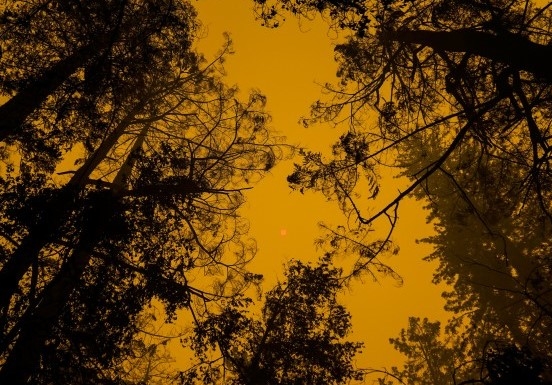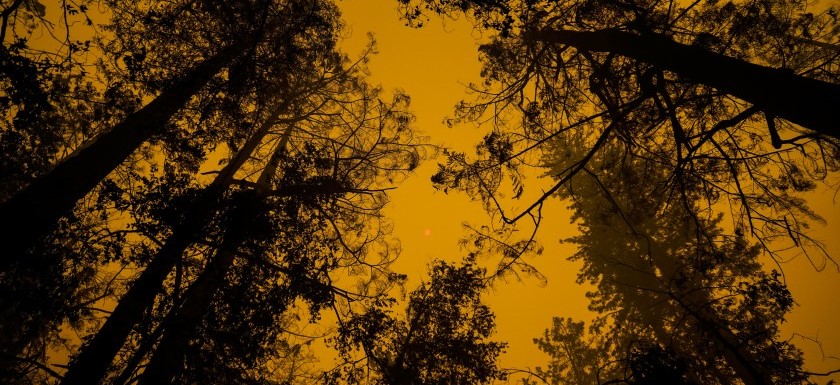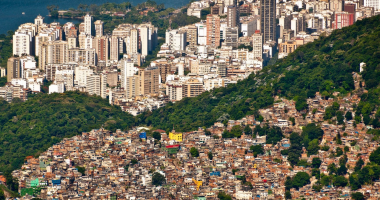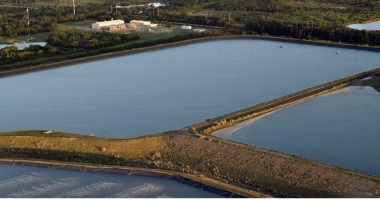Climate, Health and Equity Brief
Devastating fires, deadly storms and GOP silence
August 31, 2020

Image credit; Kent Nishimura, Los Angeles Times
The Climate, Health & Equity Brief is GMMB’s take on the week’s news on the current impacts of climate change. If you haven’t subscribed yet, you can do so by clicking here.
Hot Topic: No end in sight. California’s wildfire season is already the most destructive the state has ever seen, months ahead of its usual peak in the fall, with 1.4 million acres of scorched land, thousands of homes and buildings reduced to ash and resources quickly dwindling across the state. In California’s Big Basin State Park, wildfires toppled a beloved grove of ancient, 500-year-old redwood trees, and across the Bay Area, smoky skies full of toxic pollutants downgraded the region’s air to “hazardous” levels—exacerbating respiratory conditions amid the COVID-19 pandemic.
Meanwhile, Hurricane Laura officially made landfall in Louisiana on Thursday as a Category 4 storm. With winds exceeding 150 miles per hour, Laura is the strongest hurricane ever to make landfall in the state and the fifth strongest in U.S. history. The storm killed 14 people, forced more than half a million people to evacuate, left a path of destruction in its wake, and more potentially deadly storms are already on their way to the battered coast.
Despite the extreme weather events ravaging our nation this week, not one of the 90 speakers at the Republican National Convention even so much as acknowledged climate change or its devastation to the country, instead painting a potential Biden administration as a threat to oil and gas industry workers. With the formal withdrawal from the Paris Agreement set to begin on November 4, the day after U.S. Election Day, it is not hyperbole to say that the planetary stakes of this Presidential election have simply never been higher.
—Matt & Traci, GMMB
Health
This year’s already devastating wildfire season in California has burned 1.4 million acres, destroyed thousands of homes and structures and damaged the state’s oldest national park. (The Mercury News, Los Angeles Times)
The number of Bay Area hospital patients with respiratory complications increased this week as mostly uncontained wildfires continue to impact the area’s air quality with smoke containing hazardous pollutants. (San Francisco Chronicle)
Gusts of wind reaching 150 mph and flash flooding from Hurricane Laura, the fifth-strongest hurricane to ever make landfall in the U.S., forced over half a million people to evacuate and left 600,000 homes without power. (The Weather Channel, Yale Climate Connections)
As Hurricane Laura ravages the southeast U.S., scientists warn that planet-warming emissions will only increase the intensity of storms and make life-threatening hurricanes a more common occurrence. (The New York Times)
A new study found that air pollution is a risk factor for the development of cardiometabolic diseases such as diabetes and heart disease, with researchers comparing risk from pollution exposure to that of eating a high-fat diet. (Our Daily Planet)
Following torrential rainfall, flash floods inundated southwestern China this week, displacing millions and killing more than 200. (The New York Times)
Equity
Farmworkers in California are working outdoors in fields even as wildfires rage nearby, exposing them to scorching heat and toxic wildfire smoke which could exacerbate health risks already heightened by the COVID-19 pandemic. (The New York Times)
Residents of once-redlined communities—where access to housing loans was historically restricted for people of color—now face disproportionate exposure to extreme heat that can be up to 20 °F higher in the summer than wealthier, whiter parts in the same city due to a lack of green spaces. (The New York Times)
Politics & Economy
The Republican Party did not acknowledge the climate crisis or announce plans to curb its effects during the GOP Convention this week despite scientific consensus, mountains of evidence and multiple extreme weather events linked to climate change currently ravaging the country. (The Guardian)
Senate Democrats have unveiled a new $400 billion-a-year climate plan that calls for a clean energy transition and reforms to reduce the economic and political influence of the fossil fuel industry. (Grist)
A new analysis found that more than 3,000 oil and gas operations in the U.S. have been granted permission by the Trump administration to bypass pollution regulations and environmental tests during the coronavirus pandemic. (AP News)
A new report revealed that the cost of extreme weather events in the U.S. has quadrupled since 1980, reaching $80 billion per year, with numbers expected to increase without a reduction in emissions. (InsideClimate News)
Kicker
Looking for your next read? Check out this list of the 10 hottest climate change books of the summer.
“Twenty-five years ago people could be excused for not knowing much, or doing much, about climate change. Today we have no excuse.”
– Desmond Tutu

)





